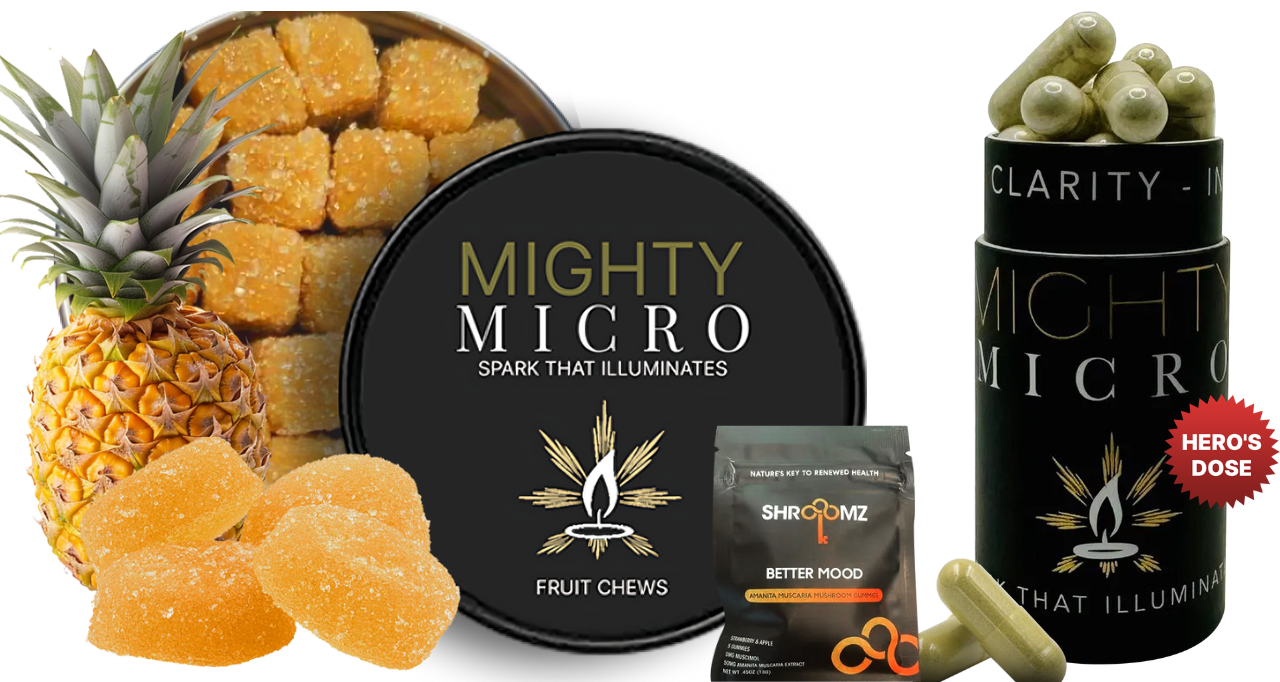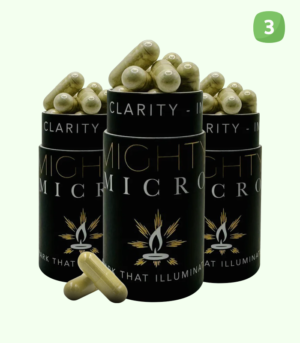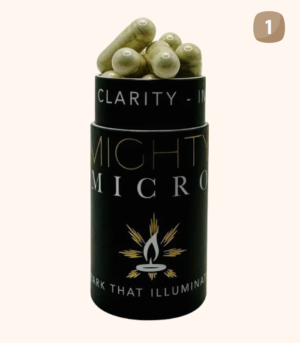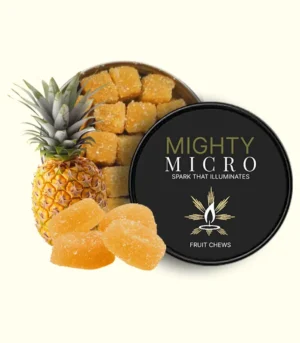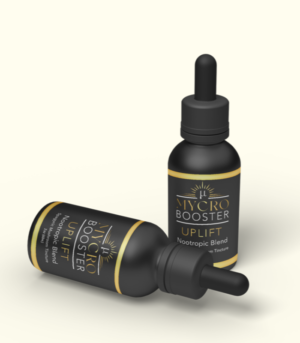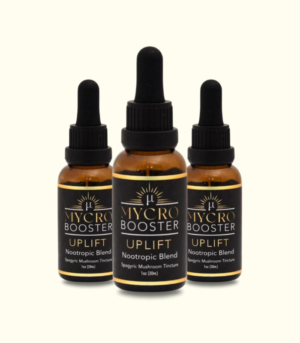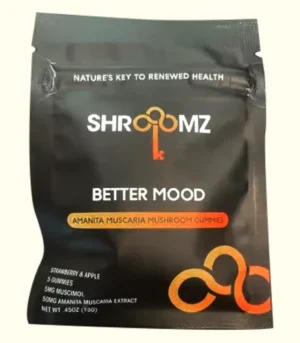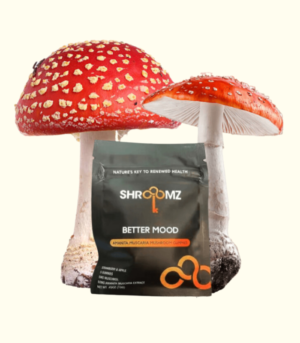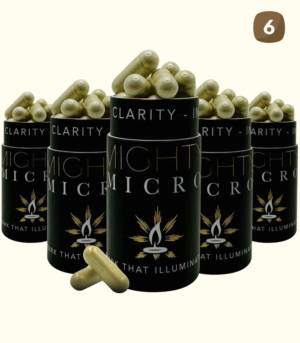Natural mushrooms, especially those with adaptogenic properties, are increasingly recognized for their stress relief benefits. Varieties such as Reishi, Lion’s Mane, and Cordyceps are known to support the body’s stress response. Reishi mushrooms, often called the “mushroom of immortality,” contain triterpenes that can promote relaxation and improve mood by interacting with the nervous system.
A study published in The International Journal of Medicinal Mushrooms found that Reishi significantly reduces symptoms of anxiety and fatigue in 82% of participants after a few weeks of regular use. Similarly, Lion’s Mane has been linked to cognitive support and emotional health, with studies showing that 68% of users report lower anxiety levels. As a result, natural mushrooms are becoming a popular option for those seeking a plant-based solution to stress management, offering a holistic approach without the side effects associated with traditional medications.
How Do Mushrooms Help Anxiety?
1. Adaptogenic Properties: Reducing Stress and Balancing the Body
Certain mushrooms, like Reishi and Cordyceps, are classified as adaptogens. Adaptogens help the body maintain balance under stress by stabilizing physiological processes, which can lead to reduced anxiety. Reishi mushrooms, often called the “mushroom of immortality,” contain compounds that influence the body’s stress response by lowering cortisol levels. This adaptogenic effect can create a calming experience, making it easier for individuals to manage anxiety.
2. Enhancing Brain Function and Emotional Stability with Lion’s Mane
Lion’s Mane mushrooms contain bioactive compounds that support brain health and cognitive function, potentially alleviating anxiety symptoms. This mushroom promotes the production of nerve growth factor (NGF), a protein crucial for brain health and neuroplasticity. Studies suggest that Lion’s Mane may improve mood and reduce symptoms of anxiety by supporting neurogenesis and brain function, which can lead to better emotional stability and reduced stress.
3. Modulating Serotonin and Dopamine Levels
Compounds in mushrooms, especially psilocybin found in psychedelic mushrooms (where legally permitted), can interact with serotonin receptors in the brain, which are closely linked to mood regulation and anxiety levels. While psilocybin mushrooms are not legally accessible in many regions, studies show that they may reduce anxiety by increasing serotonin levels, creating feelings of well-being, and reducing excessive worry. Some research indicates that even micro-dosing psilocybin can positively impact mood and decrease anxiety symptoms.
4. Improving Sleep Quality for Reduced Anxiety
Poor sleep often exacerbates anxiety symptoms, and certain mushrooms like Reishi are known to improve sleep quality. Reishi contains triterpenes, which have calming effects that can help individuals fall asleep more easily and stay asleep longer. Better sleep quality leads to improved emotional regulation, which can reduce daily anxiety and improve overall mental health.
5. Anti-Inflammatory Effects: Reducing Physical Symptoms of Anxiety
Chronic inflammation in the body has been linked to higher anxiety levels. Mushrooms such as Cordyceps and Turkey Tail have strong anti-inflammatory properties, helping reduce inflammation in the brain and body. By lowering inflammation, these mushrooms may decrease physical symptoms associated with anxiety, such as headaches, fatigue, and muscle tension, creating a calmer state of mind.
6. Boosting Energy and Reducing Fatigue
Anxiety often drains energy and causes mental and physical fatigue. Cordyceps mushrooms are known to boost energy levels naturally by improving the body’s oxygen uptake and increasing ATP (adenosine triphosphate) production, which fuels cells. By providing an energy boost, Cordyceps helps counteract the fatigue that often accompanies anxiety, promoting a more balanced mental state.
7. Supporting Gut Health for Mental Wellness
An emerging field of research, known as the “gut-brain axis,” highlights how gut health influences mental health. Mushrooms like Turkey Tail contain prebiotics that promote a healthy gut microbiome, which has been linked to improved mental health outcomes. A healthy gut can lead to better mood regulation and reduced anxiety symptoms, as around 90% of the body’s serotonin is produced in the gut.
Where Can I Buy Magic Mushroom Gummies?
How to Use Mushrooms for Anxiety?
- Choose the Right Mushroom for Anxiety
- Reishi: Known for its calming, adaptogenic effects, Reishi is ideal for reducing stress and promoting relaxation.
- Lion’s Mane: Supports cognitive health and may improve emotional stability, making it suitable for mood enhancement.
- Cordyceps: Boosts energy and reduces fatigue, which can alleviate physical symptoms of anxiety.
- Psilocybin (where legal): Microdosing psilocybin mushrooms can have positive effects on mood by promoting serotonin release.
2. Decide on the Form: Capsules, Powders, or Teas
- Capsules: Mushroom supplements in capsule form are convenient, especially for those with busy schedules. Dosage can range from 500-1000 mg per day, depending on the product and individual tolerance.
- Powders: Mushroom powders can be added to smoothies, coffee, or other beverages. Start with a small amount (½ teaspoon) and adjust gradually.
- Teas: Drinking mushroom tea is a popular method for Reishi. Brewing Reishi tea in the evening can promote relaxation and improve sleep, which in turn helps reduce anxiety.
3. Start with Small Doses
Begin with a low dose, especially if you’re new to medicinal mushrooms. This allows you to monitor your body’s response and prevent overstimulation or unwanted side effects. After a few days, you can gradually increase the dose if needed.
4. Consider Microdosing for Psilocybin Mushrooms
In areas where it’s legal, some people use micro-dosing of psilocybin (small doses of psychedelic mushrooms) as a tool for managing anxiety. A typical microdose ranges from 0.1 to 0.3 grams, taken every few days. Microdosing aims to avoid any psychedelic effects while promoting mental clarity and mood stability.
5. Create a Routine for Consistent Use
Regular use of medicinal mushrooms can be more effective than occasional consumption. For example, take Lion’s Mane each morning with breakfast, or Reishi tea before bed. Consistency can lead to better long-term benefits in managing anxiety symptoms.
6. Combine with Other Relaxation Techniques
For optimal results, use mushrooms alongside other relaxation techniques like meditation, deep breathing, or exercise. These practices can complement the calming effects of mushrooms and enhance overall mental health.
Conclusion
Natural mushrooms offer a safe, effective way to manage stress and enhance well-being. With adaptogenic properties that help balance cortisol, improve brain function, and boost energy, mushrooms like Reishi, Lion’s Mane, and Cordyceps are ideal for stress relief. Adding these mushrooms to your wellness routine can be a powerful step toward achieving greater resilience in the face of everyday stress, providing a holistic and natural approach to mental health.
FAQs
Which mushrooms are best for stress relief?
Reishi, Lion’s Mane, and Cordyceps are among the top mushrooms known for stress relief. Reishi helps with relaxation, Lion’s Mane supports brain health and mood stability, and Cordyceps boosts energy to counteract stress-related fatigue.
How do Reishi mushrooms reduce stress?
Reishi mushrooms are adaptogens, meaning they help balance cortisol levels, the primary stress hormone. They also have calming properties that promote better sleep and relaxation, helping to reduce overall stress.
How often should I take mushrooms for stress relief?
Mushroom supplements are generally taken daily for consistent results, but dosage varies. It’s best to follow the instructions on the product label or consult a healthcare provider for personalized guidance.
Are there any side effects of using mushrooms for stress relief?
Medicinal mushrooms are typically safe, but mild side effects like digestive upset may occur in some individuals. It’s important to start with a low dose and consult a healthcare provider if you have any concerns or pre-existing conditions.
How long does it take for mushrooms to relieve stress?
Effects vary depending on the individual and the mushroom type. Some people notice calming effects within a few days, while others may take several weeks to experience full benefits.
Can I combine different mushrooms for better stress relief?
Yes, many people use mushroom blends that include Reishi, Lion’s Mane, and Cordyceps together to enhance their adaptogenic and stress-relieving effects. However, start with a low dose to assess tolerance.
Are mushroom supplements or powders better for stress relief?
Both forms are effective; it depends on personal preference. Powders are versatile and can be added to drinks, while capsules offer convenience and consistent dosing.
Do mushrooms for stress relief improve sleep?
Yes, particularly Reishi, which is known for promoting relaxation and better sleep quality. Improved sleep often leads to reduced stress levels, making it a complementary benefit.

